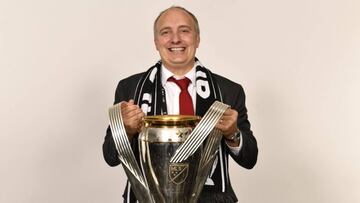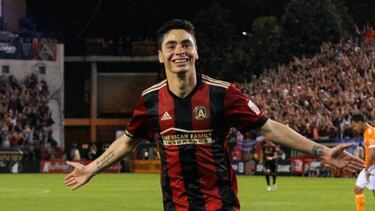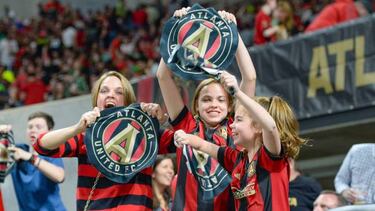Darren Eales: "MLS is capable of creating its own stars"
The president of Atlanta United has won Best Executive, presented by Nolan Partners, at the World Football Summit Industry Awards. The presentation ceremony will be held on 24 September in Madrid.


Congratulations on winning the World Football Summit award for Best Executive, presented by Nolan Partners. What does it mean for you personally and the club?
For the club, Atlanta United, it’s very exciting, when we started our vision was not only to be a top club in MLS but to be part of the global landscape of football, part of the football family. So to win an award like this shows how soccer is growing in North America and we’re becoming part of that global landscape.
So it’s exciting on that level and personally it’s an honour and a privilege to win the award; for me it’s been a great privilege to be able to build the club from scratch. It’s something that not a lot of people get the opportunity to do, in most places round the world the football clubs have been around for a hundred years, so it’s been amazing to be able to build the club in Atlanta, which is a wonderful city, with an amazing owner in Arthur Blank and the incredible support of our associates and it just all joined up together to make Atlanta United what it is today.
How did you grow the club from nothing in 2014 to winning the MLS Cup in 2018?
I joined in November 2014, so that was about two and a quarter years before we were going to kick a ball. We were very fortunate in that we had the infrastructure of the Atlanta Falcons - Arthur Blank also owns them - so I was able to lean back on some of their infrastructure and they were incredibly helpful as we were building up the club. It really was a case of starting in November 2014 and putting together the team both on and off the pitch to hit the ground running in March 2017, when we kicked off.
What was the hardest thing you found in those years when you weren’t playing football?
Obviously I was coming from the hustle and bustle of the Premier League - West Bromwich Albion and Spurs over 10 years - where the whole rhythm of your week depended on the results on the pitch, so it was really quite strange having no matches. It was quite hard because you weren’t getting the immediate feedback of a game, but the good thing was that we were unbeaten for two years [laughs].
You won the MLS Cup in just your second year; how did you go about building a winning team?
I played over here, and I was in the A League – the top professional league before MLS started in ’96 - and I was playing in ’95 with a team called the New York Centaurs, and that gave me a real insight. They were trying to Americanise soccer, because the idea was that soccer wasn’t high scoring enough, it wasn’t like the other American sports, so we needed to change it. but when you tried to Americanise soccer what happened was that those people who already loved the game thought it was weird, and for those people who weren’t soccer fans, it didn’t make much difference if there was music playing while the game was on, or if you were having shoot-outs that didn’t really attract the fans either.
So I remember playing in New York in front of 200 people and it just wasn’t working. Fast forward to now and MLS has done a great job of just keeping soccer like it is in the rest of the world, and now we’ve got a fan base that knows and loves the game. And I remember talking with Arthur Blank in the early meetings when we were discussing the possibility of me coming over and what I really felt was it was a time when we could attract a younger player into the league, develop them and they could prove to themselves they could go to a top league in Europe.
So how did you do that?
So our three designated players were Miguel Almirón, Tito Villalba and José Martínez. Three wonderful players for Atlanta United but in all honesty if you’d asked our fans at the time we signed them most people didn’t know who they were. But they were really effective for us on the pitch and they helped us become the team that won the MSL cup after two years.
What I always really liked about it was that at the end of our first season, Miguel Almirón was the top selling shirt in MLS and Sebastian Schweinsteiger was the number two shirt. Obviously he’s a great player - Bayern Munich, Manchester United, German national team - but what we showed was that Miguel could sell more shirts than him.It proved we could create stars, it wasn’t just about going out and getting stars. You didn’t need to sign a player at the end of their career to sell tickets and shirts. If you could put an exciting product on the pitch and sign exciting young talent you could create stars. I think we demonstrated that in our first year and I’m pretty excited about how the league is going forward now with more and more exciting young talent coming into the league to all clubs, and that’s good for the growth of the game, it’s good for MLS, and I’m excited that Atlanta United has played it’s part in that.

Atlanta United has the single-game attendance record for MLS (72,243 spectators) and an average of fifty-three thousand spectators per match. How did you build such a loyal fan base for an entirely new club?
We didn’t use any of the traditional marketing - TV adverts or billboards- we tried to do it through the grassroots. We were very fortunate in that we had a lot of people sign up when it was announced the team was coming to Atlanta in 2014 and we had some interest straight away from people who put down a $50 deposit. So the approach we took was to nurture that avid fan base and build a club mentality and the feeling of being part of a movement. We chuckle about the book we could write, ‘Pub crawl your way to success’, because literally any time we could engage with our fans we did - whether that was viewing parties for the Premier League on Saturday mornings or when the United States and Mexico national teams were playing matches... any time we could we tried to get out there and meet with our fans and create great moments, times for fans to get together and enjoy the whole social nature of being part of a soccer club.
We took over any event we could in the city… in Atlanta they have a lot of festivals and parades so we would gather our supporters groups to go to those and this was before we even had a team playing on the pitch, and it really worked well. By the time we played our first game we had a sell-out crowd of over 50,000 and the energy and the passion right from day one was maybe the most surprising thing for me. I knew we’d got the numbers but I never imagined we’d have the level of engagement and passion and excitement that we did from day one and it’s really just grown from that.

What can European football learn from American soccer?
The thing I’ve learnt the most coming to America and what European clubs and leagues can learn from America is the focus on the supporters. Let’s take Atlanta United, we’re competing with not only the Falcons, the Braves, the Hawks, but also college sports which are a huge thing - college football is massive in Atlanta - so we’re competing on a number of levels, and so everything we do has to be focused around the supporter and seen through the lens of how things affect them.
You have to try and win the hearts and minds of the fans and you can’t take them for granted. I think it’s a little bit easier in Europe, because of the history and the heritage of many football clubs and the fact that the media rights are so big that there’s a tendency perhaps to take the fans a little bit for granted but we knew we couldn’t afford to do that from day one and I think that’s really helped Atlanta United and I think that’s what MLS does a great job of: focusing on the supporter.
The food alone at the stadium looks impressive…
That’s a good insight into what drives our owner Arthur Blank. From his perspective, the model of food pricing in stadiums around the world was broken. His view is that this is somewhere we can give back to the fans, so have a $1.50 hot dog and unlimited refills on match day. It means you’re not gouging the fans just because you’ve got them in the building and I think that goes a long way. It shows you’re putting the fans first and they identify with that. It’s a way of us trying to give back to the fans.
What’s the toughest part of being the president of Atlanta Utd?
Working in a salary cap environment. That’s probably the biggest difference from working in European football or the rest of the world and the thing that leads to the toughest decisions, because with the salary cap there’s a certain amount we can spend. So when we won the MLS Cup, in only our second season, if we gave someone a raise and a contract to say well done for what they did that money has got to come from somewhere else. So you have to make tough decisions elsewhere and that may be trading a player just to make cap rules. For me it’s the toughest area of decision making, because it’s a zero sum game. When I was at Tottenham, if you had a good season you could give everyone a little bump in their pay and it wouldn’t make a difference but you just can’t do that in the American system.
Was the decision to sign Tata Martino a definite decision because of the way he played?
Right from day one we spoke about having a philosophy of wanting to play exciting goal-scoring soccer and the players we found before Tata Martino came on board were people in that mould so Tito Villalba, our first designated player signing, was a speedy winger who came from San Lorenzo, so that was always our view. With Tata, we had a mutual acquaintance in Mauricio Pochettino, the last coach hired when I was at Tottenham, and he’d played at Newell’s Old Boys with him, so when I flew out to see him in Rosario, I pretty much knew he was going to be the man for us, with his experience, his background, his style of play, he was perfect for us as a manager.
It was interesting though because the wisdom at that point in MLS was still to be careful about signing foreign managers. The perceived wisdom was that MLS is difficult because of the travel, and with the salary cap and perhaps American managers would do better. My view on was that you had to look at the rationale behind it and the underlying facts behind those rules of thumb, and my view was that if we set up the infrastructure to allow Tata to succeed there was no reason why he couldn’t do the role. In fact it’s no difference to having a sporting director in Europe, who’s in charge of the playing squad and then the coach comes in and coaches the players. And of course Tata did a fantastic job for us, not only in terms of our style of play but also results, winning the MLS Cup in our second season.
And now under De Boer you’ve won the US Open Cup…
Yeah! It’s been a great season. It is hard in a salary cap environment to be a defending champion, but we’re now sitting in a great place. We’ve got, I think, the second best record in the last 10 years of defending champions and we’ve won the Campeones Cup - the MLS Champions against the Champions of Mexico - we beat Club América who are a great, historical side from Mexico, in a really exciting game at the Mercedes Benz stadium and then we won the US Open Cup which is our equivalent of the FA Cup, so we’ve already qualified already for Champions League next year. It’s been a phenomenal season given that it’s always difficult coming off the back of a championship, so we couldn’t be happier.

When do you see an MLS side next winning the Champions League?
It’s a big challenge for Major League Soccer. We’ve had experience of the tournament this year, our first time in it, and it is tough because we’re in a league with a salary cap up against Liga MX which doesn’t have that and we saw it when we played Monterrey in the quarter-finals this year. They’re bringing Pizarro [Rodolfo Gilbert Pizarro] off the bench and he’s a top quality player on a decent whack of salary and he’s coming on and at right back we’re got a player on minimum salary, perhaps earning $70,000 a year, because we had an injury to our right back, so it’s tough.
We are aware of that at league level in MLS and we need to keep improving the product on the pitch and improving the depth. It’s happening year to year, so I think it’s only a matter of time and there’s little things as a league that we need to do to help those clubs that are in the Champions League, because we’re playing at a difficult time - our first Champions League game was four and a half weeks after the start of pre-season and then you’re going into your regular season when you’re at the quarter-final level, so there are things that can be done with the schedule to ease the burden on the clubs in the Champions League and that’s something we’ll look at strategically. I’m hopeful that sooner or later we’ll see an MLS club lift the Champions League… I just hope it’s Atlanta United!
What’s the limit for MLS?
Related stories
We’re in the biggest economy in the world, 300 million population, all the tailwinds are looking really good for soccer, it’s a sport that attracts the younger demographic, the Hispanic and immigrant population coming into America already identify with the sport, so we’ve got a lot of positive things happening and I think if you look over the past five to ten years the product level is clearly improving.
We’ve shown with Miguel Almirón that you can take a player who is young, in his prime and develop him and then move him on to top leagues, so I think we’re seeing a movement away from bringing in players who are at the end of their contracts and focusing on that younger talent, developing them and moving them on. I think it’s a league that’s only going from strength to strength and it’s only a matter of time before people are talking about MLS as one of the top leagues in the world.
Sweet dreams, Atlanta!#UniteAndConquer #USOpenCup2019 pic.twitter.com/ZtewOiuWTA
— Darren Eales (@DEalesATLUTD) August 28, 2019